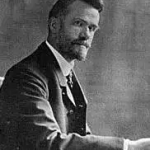“Historical Jesus” Debate: An Unexamined Premise?by larryhurtado |
(WHAT FOLLOWS IS A POST BY MY FRIEND AND COLLEAGUE LARRY HURTADO)
The latest issue of Journal for the Study of the Historical Jesus arrived earlier this week, a special issue devoted to the topic of what contribution “Evangelical” scholars might be able to make to the on-going discussion. It will be interesting to see what the various authors (who include prominent “Evangelical” scholars and also a couple of critics) have to say for themselves. But it prompts me to make here two observations I’ve made in some other settings.
First, the whole enterprise of “historical Jesus” discussion (in these terms) was prompted by theological interests, and those engaged in it have typically done so from their own theological interests (often acknowledged, but quite often unacknowledge, sometimes even denied). It began with 18th-century critics of established/institutional Christianity seeking to break its hold in European societies. Their move was a clever one.
Just as early Protestant reformers had played off the NT against the accretions of doctrines and structures that had come to form the institutional church of their time, so these Deist thinkers determined to play off Jesus against the NT. That is, they pushed the view that the NT itself already partook of the human, fallible developments that continued on into the developing church (which I think is unquestionably so). So, whereas Protestant figures had insisted that only the NT was authoritative, over against authority-claims of the institutional (Roman Catholic) church, the Deist move was to insist that Jesus trumped the NT.
This meant, then, that one had to draw out a distinguishable picture of a “historical” Jesus from the NT sources (the Gospels) on some valid basis. The early Enlightenment move often involved drawing upon “natural reason” as a basis for judging what Jesus could or could not have done/taught. That was a view that didn’t survive that period, and so subsequent scholars have devoted enormous energies to devising criteria by which to establish convincingly a body of material that could be used to develop a “historical” picture of Jesus, especially his teachings. As any reviewer of this effort can testify, however, it has proven very difficult to come up with a set of criteria that are accepted by all, and more difficult still to produce results from criteria that are accepted by those not already inclined to do so.
But my first point is double-barrelled. Number one, this whole enterprise was initiated with clear theological and political intent: To subvert the authority of establishment Christianity in European societies in favor of a “natural theology”, or at least a seriously revisionist definition of Christianity. Number two, it seems to me that pretty much everyone subsequently also has had this or that theological stand and purpose, right on down through the “Jesus Seminar”, the “third Quest”, and others.
Some (in the footsteps of the originating Enlightenment figures) have sought to produce a Jesus who could support their aims of critique and/or subversion of establishment versions of Christianity. Others have sought to produce a Jesus who could support, or be congruent with, this or that version of traditional Christianity. It’s pretty hard to find anyone with no interest in the results (including some who, amusingly, profess to have no such interest).
My second point is that both sides have subscribed to a common premise, which goes something like this: If a serious difference can be shown between what Jesus himself taught (especially what he taught about himself) and what early Christians believed (especially what they believed about him), then this would comprise a major theological problem for the validity of traditional Christian faith. The one side seeks (with intent!) to establish such a major difference, and the other side seeks energetically to minimize it, both sides working on the same premise.
My own response is: Says who? What is the justification for the premise I’ve described? Why should a difference between what Jesus taught about himself and what believers subsequently came to assert about him be a problem? NT texts don’t say that the reason people should accept the christological claims that they advance is that Jesus taught them. Instead, NT texts typically assert that their christological claims are based in the actions of God, and the greater realization/revelation of Jesus’ significance that came thereby.
Indeed, NT texts quite candidly say that Jesus now bears a status and significance that was conferred by God (e.g., Philippians 2:9-11, et alia), and that it was only after Jesus’ resurrection that his full significance was apprehended (e.g., Matthew 28:18-20; Luke 24:44-49). Even the Gospel of John, in which we have the most direct christological claims on the lips of Jesus, tells us that these claims were revealed by the Spirit of God (“Paraclete”) after Jesus was “glorified” (e.g., John 14:25-26; 15:26-27; 16:12-15). Indeed, the Gospel of John should probably be read as an account of Jesus programmatically written in light of what the author regarded as the revelation of Jesus’ significance by the Spirit in the “post-Easter” setting.
In sum, the basis for the christological claims of NT texts was never that Jesus taught and commanded them, but, instead, rested in what God had done, in raising Jesus from death and exalting him to unique heavenly glory. That is, NT christological claims always had a profoundly theo- logical basis. Whether one accepts what the NT asserts about God’s actions is another issue. My point here is that God’s actions are posited in the NT as the major basis for the religious claims that they reflect.
To be sure, it is in principle a thoroughly interesting and worthy historical task to try to establish what we can about Jesus of Nazareth, his own words, actions, experiences, beliefs. There are real difficulties involved, of course, but it’s entirely worthwhile to make the attempt. But the emotional investment of either side in the debate I’ve sketched here is prompted by the dubious premise I’ve identified.












